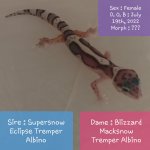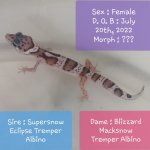I highly recommend you go back to the breeder to get more information if possible. The biggest problem is with picture 1. The gecko on the left is a tremper albino and may be a super snow. It is definitely not a blizzard; a blizzard would have no spots at all. I suspect it's a super snow albino that has a gene for blizzard. Blizzard is a recessive gene, so it can be passed on but will not show up visually unless the offspring has another parent with a blizzard gene as well. It's hard to tell whether or not the gecko is an eclipse because all super snows have solid colored eyes which is the eclipse trait. The breeder will have to tell you whether this gecko is definitely an eclipse, or whether it has a gene for eclipse.
The gecko on the right may or may not be a mack snow. Mack snow geckos hatch black and white (or beige and white in the case of an albino) and get yellower as they mature. It is definitely not a tremper albino, though it may have a gene for Tremper albino. Albino geckos never have black markings.
The geckos in the second picture appear to be what you have written down, though the "jungle" is more of a "stripe" which is just a more stripe-like presentation than the camouflage patterned jungle.
I highly recommend you google some pictures of the morphs you've been told to see the similarities and differences.
The puzzler is the gecko that hatched on August 11. It is obviously not a mack snow. That tells me that the non-albino parent is not a Mack snow either, because a gecko needs to have 1 copy of the mack snow gene to hatch black and white and 2 copies of the gene to hatch looking like a hatchling super snow. The problem is, that if your other gecko is a super snow, then it would be giving one copy of the mack snow gene to all the offspring and this doesn't seem to have happened here.
I have a few recommendations:
a. if you can, go back to the breeder and clarify which gecko has the actual visible traits and which have a gene for a trait which is not visible. Let the breeder know that your super snow gecko has produced a non Mack snow gecko and see what they have to say about that.
b. It's going to be very hard for you to ethically sell your geckos as anything but pets because I don't think you have the correct genetic information (unless you can iron out with the breeder all the inconsistencies) about the parents or the offspring. A reasonable breeder of geckos would't want to use these geckos as breeders because their genetic history is largely unknown. There are other people who won't really care about the genetic history and will pair them up as if they were cats or dogs. Some people think that's fine, but those who are concerned about keeping genetic lines straight aren't too happy about that. You'll have to think about that and see how you feel.
c. In general it's not a great idea (though obviously it's possible to do) to breed geckos without having accurate genetic information and without knowing enough about basic genetics to figure out the morphs of the offspring. I can see where identifying the morphs would be hard for you because I don't think you have complete and accurate information. The important thing is, I do feel strongly (and remember, no matter how strongly I feel, it's still just my opinion --though it's a lot of other people's opinions as well) that a responsible breeder understands enough about basic leopard gecko genetics to know what possible offspring outcomes could be and to tell what they are most of the time. My biggest recommendation is to continue to educate yourself to be able to do this.
Feel free to ask additional questions if I haven't been clear about anything.
Aliza








